|
|
|
Sort Order |
|
|
|
Items / Page
|
|
|
|
|
|
|
| Srl | Item |
| 1 |
ID:
095117
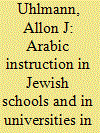

|
|
|
|
|
| Publication |
2010.
|
| Summary/Abstract |
Teaching is never merely a technical, pedagogical issue. This is especially true of Arabic teaching in Israel. Two related factors have conditioned the evolution of Arabic instruction in Israel in various, often contradictory ways. One is the Zionist modernist project of inventing a Jewish nation by bracketing off Jews from gentiles and reconstituting them as a distinct Hebraic ethno-linguistic community. The other is the project of securing historic Palestine as an exclusive national homeland for this newly invented nation and the consequent ambivalence toward Arab existence in historic Palestine. Both make up what I term Zionist sectarianism, and their influence on Arabic pedagogy has been decisive and pervasive, yet contradictory and unpredictable, demonstrating that although practice is always political, it is never mechanically reducible to its political underpinnings.
|
|
|
|
|
|
|
|
|
|
|
|
|
|
|
|
| 2 |
ID:
194928


|
|
|
|
|
| Summary/Abstract |
My contribution to this special issue is non-orthodox. Far from Islamic Feminism's hermeneutics, and bearing in mind the limitations of anthropological works and representative paradigms in Orientalist critique, I take cues from postcolonial scholar Edouard Glissant’s (1990) seminal work, Poetics of Relations, notably his notions of détour, retour, and érrance, and draw on my experience in teaching gender studies in relation to the Middle East in UK higher education institutions to posit a “pedagogy of opacity” when producing knowledge on Othered bodies —in this instance, the fictive category of the “Muslim woman”. We see how a pedagogy of opacity forces home, self, and early mis/information about the other to realign and confront each other. This triadic realignment showcases the workings of home (the UK)—not of a geographically distant Islamic culture—in the manufacturing of the Muslim woman Other.
|
|
|
|
|
|
|
|
|
|
|
|
|
|
|
|
| 3 |
ID:
090260
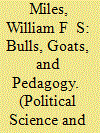

|
|
|
|
|
| Publication |
2009.
|
| Summary/Abstract |
This article illustrates the profound learning that occurs-for students and instructor alike-when a class on third-world development attempts to undertake foreign aid. With undergraduate, graduate, and departmental money, I purchased bulls and carts for farmers, and goats for widows, in two West African villages. Such experiential learning personalized for students the study of micropolitics under conditions of poverty, the development of organizational structure, and north-south dependency.
|
|
|
|
|
|
|
|
|
|
|
|
|
|
|
|
| 4 |
ID:
078495
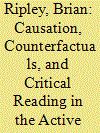

|
|
|
| 5 |
ID:
138927
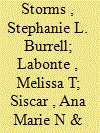

|
|
|
|
|
| Summary/Abstract |
This article examines a multiyear project funded by the Teagle Foundation to assess student learning in humanitarian studies. It explores outcomes derived from developing a collaborative learning approach to humanitarian action that emphasizes both cross-campus and cross-institutional peer-to-peer learning and exchange. Faculty, staff, and students from Fairfield, Fordham, and Georgetown Universities worked together as members of the Jesuit Universities Humanitarian Action Network (JUHAN) to design an innovative and comprehensive assessment process for curricular programs in humanitarian studies, as well as courses with significant humanitarian content. In particular, we focus on the value of establishing cognitive and affective learning objectives, developing tools and methods to assess learning (for example, rubrics and vignettes), demonstrating use of these tools through piloting and data analysis, and closing the assessment “loop.” As the first of its kind assessment strategy for humanitarian studies at the undergraduate level, we argue that these efforts make important inroads in establishing a common baseline for measuring learning in the burgeoning field of humanitarian studies. They also contribute to preparing individuals for futures in the humanitarian profession and to becoming “men and women for and with others.”
|
|
|
|
|
|
|
|
|
|
|
|
|
|
|
|
| 6 |
ID:
195395


|
|
|
|
|
| Summary/Abstract |
In a recent article, Maria Eriksson Baaz and Swati Parashar1 trace the continued salience of Eurocentrism in critical International Relations (IR), demonstrating how the ‘master’s outlook’ continues to stifle the study of global politics; they ultimately encourage an unsettling and even implosion of the discipline. Starting from this proposed ‘implosion’ of critical IR, this article reflects on our hopes, as two current PhD candidates and one early career researcher in global politics, for teaching and learning in this future world. We begin by reflecting on our own complicity in reproducing the Western-centrism of the discipline and consider how this discomfort can be used productively. The article then considers the radical potential of the classroom and the necessity of empathetic, collaborative inquiry to the future of the discipline of global politics. We advocate for an IR which is imaginative, relational, messy, and vulnerable – and are hopeful about how this may animate a meaningful and sustainable implosion. Embracing our discomfort and the possibility of failure, we hope to contribute to the ongoing ‘unsettling’ of academia from the standpoint of incipient feminist scholars and hopeful early-career teachers.
|
|
|
|
|
|
|
|
|
|
|
|
|
|
|
|
| 7 |
ID:
090656
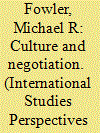

|
|
|
|
|
| Publication |
2009.
|
| Summary/Abstract |
This article examines one especially challenging aspect of active-learning international studies courses-the use of cross-cultural simulations. What is the significance of culture for negotiation? What difficulties might cross-cultural negotiations pose, and how might negotiators work with cultural differences to achieve successful outcomes? Is it possible to model the effects of cultures on negotiators in a classroom role-play? What are the advantages to using cross-cultural simulations, and what difficulties do they entail? How might an instructor make best use of materials that focus on cultural issues and their effect on negotiation? When teaching students of different cultures by active-learning methods, what ought an instructor to bear in mind? What cross-cultural simulations are available, and what readings might be assigned to accompany them?
|
|
|
|
|
|
|
|
|
|
|
|
|
|
|
|
| 8 |
ID:
178253
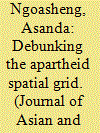

|
|
|
|
|
| Summary/Abstract |
Traditional universities are often interrogated on their pedagogic underpinnings, while universities of technology are often left unchallenged on knowledge production. Universities of technology are often assumed to be transformed because they are a post-apartheid creation, with a mainly black, working-class student body. This assumption has led to little interrogation of the university of technology and its relationship with knowledge production. This paper explores the nature of curriculum contestation and reform at a university of technology. It outlines the historical context of a university of technology and its approach to curriculum development, which has implications for current curriculum transformation efforts. Using autoethnographic research methodology, the paper tracks a multi-year journey towards the development of a transformative, socially just curriculum intervention in the extended curriculum programme for the Architecture and Interior Design programme at a university of technology. The paper concludes that curriculum change does not happen in a vacuum, that it is political, difficult and emotionally taxing, and that it is best done in collaboration with different education stakeholders.
|
|
|
|
|
|
|
|
|
|
|
|
|
|
|
|
| 9 |
ID:
115310
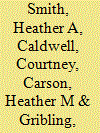

|
|
|
|
|
| Publication |
2012.
|
| Summary/Abstract |
This article shares the experiences of an instructor, and six of her former students, in the design, implementation and assessment of an art gallery project. The project was a mid-term assignment in a Gender and International Studies course. The article starts with the instructor sharing her views on pedagogy and the aims of the assignment and then the former students share their experiences with the project. Both the project and the experience of writing this article are the source of concluding reflections. The insights the former students reveal the embedded nature of traditional models of education as well as the value of student centered collaborative projects. The students' reflections also show how "doing it differently"-engaging in a project so beyond the norm of the traditional classroom space translated into reflections on gender and our everyday in ways that were transformative.
|
|
|
|
|
|
|
|
|
|
|
|
|
|
|
|
| 10 |
ID:
192311
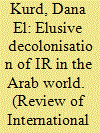

|
|
|
|
|
| Summary/Abstract |
Arab social science scholarship, and IR in particular, has been systematically underfunded and sidelined by governments across the region. As such, IR scholars in the Arab world have struggled to produce scholarship in hostile and authoritarian environments, let alone address efforts to decolonise. Of the few initiatives of indigenising social science that exist in the Arab world, the Doha Institute for Graduate Studies (DI) and its founding institution, the Arab Center for Research and Policy Studies (ACRPS), are the main examples. In this intervention, I will review the attempts to indigenise and decolonise IR within these institutions. I focus on how the DI is implementing three main approaches: increasing access to the discipline, rethinking how we teach IR, and facilitating theory production from the region. I demonstrate the strengths and weaknesses of the three abovementioned approaches by drawing attention to performative measures on the part of regional scholars, and pretending localism on the part of scholars in the Global North, which together help to perpetuate neomarginalisation. The shortcomings discussed permeate and distort attempts to decolonise the discipline within the Arab world.
|
|
|
|
|
|
|
|
|
|
|
|
|
|
|
|
| 11 |
ID:
106356
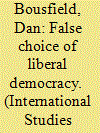

|
|
|
|
|
| Publication |
2011.
|
| Summary/Abstract |
This article discusses practical forms of participatory assessment in the international relations (IR) classroom to examine the relationship between teaching and practicing democracy. These techniques include a series of exercises that allow students to explore the links between IR course content and classroom pedagogy. Drawing on the work of Slavoj Žižek, this study examines the ways in which participatory teaching methods challenge students to think about freedom and participation in the classroom and in general. Creating a responsive and participatory classroom generates important questions about the nature of foreign policy creation and the practical and ideological limits on democracy in IR.
|
|
|
|
|
|
|
|
|
|
|
|
|
|
|
|
| 12 |
ID:
126696
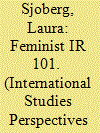

|
|
|
|
|
| Publication |
2013.
|
| Summary/Abstract |
This article discusses the pedagogical potential of a series of blog posts called "Feminist IR 101," which I wrote and posted on Duck of Minerva (duckofminerva.blogspot.com) over the course of 2010 and 2011. As our students increasingly rely on the internet as a source of not only news but knowledge and opinions, this group of posts looks to reach our student audience (and perhaps even others in the discipline) differently than textbooks or other traditional materials. They were meant to be an introduction to feminist IR in the true sense of the word-what feminist IR is, the vocabulary it uses, how it is useful in analysis, and why it is meaningful to scholars and students of gender and global politics. Their goal is to account for both what a feminist perspective contributes to the study of global politics and why I chose to do my research from that perspective. This short article looks specifically at both the "Feminist IR 101" project and its potential classroom uses, as well as the pedagogical value of blogging feminist IR more generally.
|
|
|
|
|
|
|
|
|
|
|
|
|
|
|
|
| 13 |
ID:
178607
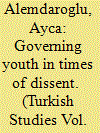

|
|
|
|
|
| Summary/Abstract |
This article examines the AKP’s youth politics in the aftermath of the 2013 Gezi Protests. It focuses on a seemingly mundane cultural practice of essay writing and student essay competitions to investigate the party’s message and methods in addressing young people. In particular, it examines the politics of history and emotional politics in the party's effort to construct and administer youth publics. The article argues that the AKP’s power is embedded in and reproduced by the articulation of political differences and mobilization of emotions, which play a significant role in the party’s broader bid to reorganize society, redefine collective identity, and control dissent.
|
|
|
|
|
|
|
|
|
|
|
|
|
|
|
|
| 14 |
ID:
139425
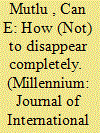

|
|
|
|
|
| Summary/Abstract |
The question of research methods, and their role in the field, is a major source of contention for IR scholars. We can, however, discuss method, methodology, and innovation without revising or revisiting old debates. Methods do not have to be divisive, or disciplining. A frank discussion of research design, methods, and methodological preferences is essential to innovation and reproducibility. This intervention is a call for increased transparency in IR research outputs; IR theorists should not erase their own footprints from their publications and openly admit and discuss failures as productive moments in research. The act of disappearing, which has become the norm in the name of professionalised publications, robs the field of the productive pedagogical potential of research methods. The true impact of research rests in its pedagogical potential. As researchers, our job is thus to find a sensitive balance between not determining the outcome of the research from the get-go by making it all about our preferences and opinions, but also not making the impact of our preferences and opinions disappear completely. Building on this premise, this intervention discusses the significant pedagogical potential of research methods, reproducibility and discussion of failures in International Relations.
|
|
|
|
|
|
|
|
|
|
|
|
|
|
|
|
| 15 |
ID:
188177
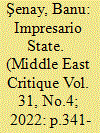

|
|
|
|
|
| Summary/Abstract |
Since the early 2000s, under successive Justice and Development Party (AKP) governments, Turkey has developed more systematic ‘engagement’ policies with its extra-territorial communities, including citizens abroad, kin and ‘relatives’, and non-Turkish international students sponsored to study in Turkey. This article examines the governmental techniques taken up by the ruling AKP elites to mobilize these constituencies as a source of what Félix Krawatzek and Lea Müller-Funk call ‘political remittance.’ To achieve this goal, the Turkish state has configured itself as an ‘impresario.’ It utilizes public pedagogy and political spectacle as key devices through which to generate desired remittances from extra-territorial communities, as well as to cast and craft its future leaders, friends, and allies.
|
|
|
|
|
|
|
|
|
|
|
|
|
|
|
|
| 16 |
ID:
170408
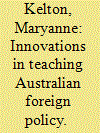

|
|
|
|
|
| Summary/Abstract |
More than ever as the uncertainties of a digitalised world are upon us and where power shifts to and within the region disrupt the familiar patterns of engagement, the acquisition of the knowledge and competencies necessary for Australia to be a trusted international partner are pressing matters. So too, in the development of both personal and professional skills, our pedagogic remit to students guides us to assist them in learning more about themselves in the process. How, then, should we teach Australian foreign policy and in doing so grow the conjunctive tissue of student self-learning in order to prepare students for the world of diplomacy necessitated by Australia's international workspace? Here, experiential learning can have a powerful effect in the teaching of Australian foreign policy and in the development of students' life and professional skills. Both in-person simulations situated within the context of a thoughtful curriculum, and short-term international mobility study tours can contribute to an effective mix of learning experiences and assist us in moving closer toward effective practice in the current uncertainties and an era of digital transformation.
|
|
|
|
|
|
|
|
|
|
|
|
|
|
|
|
| 17 |
ID:
110586
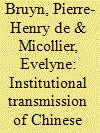

|
|
|
|
|
| Publication |
2011.
|
| Summary/Abstract |
The aim of this article is to propose a typology of the different issues that the transmission of traditional Chinese medicine encounters today in the world, by successively highlighting ideological, epistemological, political, and educational difficulties. After showing how much the polarised aspect of the debates on Chinese medicine is already entrenched among specialists in this discipline, we explore the question of the epistemological status of this Chinese tradition by confronting it with the dominant biomedicine of Western origin. The originality of Chinese structures that were set up to protect and promote this national tradition is then highlighted as a possible source of inspiration at the international level, before describing the different economic factors likely to play a positive or negative role in the development of this medical and cultural heritage at the local level. Finally, the specific didactic questions that the transmission of this heritage and the teaching of this discipline raise are analysed before presenting a conclusion.
|
|
|
|
|
|
|
|
|
|
|
|
|
|
|
|
| 18 |
ID:
098442
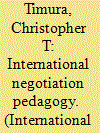

|
|
|
|
|
| Publication |
2010.
|
| Summary/Abstract |
This collection of articles on international negotiation pedagogy compares and contrasts a range of training methods and theories employed by scholars who teach international negotiation from different disciplinary backgrounds and in diverse institutional settings. Notwithstanding this variation, the contributors share a focus on enabling students to engage in negotiation and conflict analysis by teaching a set of core heuristics, to better understand interpersonal behavioral dynamics and learning certain interpersonal skills, and to practice negotiation and conflict analysis through the use of role plays and simulations. The contributors make different observations about the impact of students' personal knowledge and experiences on their ability to learn negotiation skills, and have developed different ways of incorporating student backgrounds in their approaches to negotiation training. The development of more complex simulations is one way instructors are beginning to leverage student knowledge and experience to achieve pedagogical goals.
|
|
|
|
|
|
|
|
|
|
|
|
|
|
|
|
| 19 |
ID:
115307
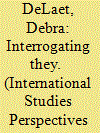

|
|
|
|
|
| Publication |
2012.
|
| Summary/Abstract |
This essay discusses a pedagogical approach to the teaching of international relations grounded in both a pluralist approach to the study of politics and post-modern feminism. Whereas pluralism helpfully draws attention to the wide range of actors that play a role in world politics and the multiplicity of factors that shape the motivations, identities, and behaviors of these actors, post-modern feminism underscores the fact that actors-and their identities, norms, and interests-are constructed rather than given. In combination, these perspectives encourage students and teachers to focus not only on diversity within and across societies but also on the possibilities for constructing alternative models of politics and for building coalitions across presumed divisions of politics, ideology, culture, gender, and other social markers. The essay provides an overview of strategies for integrating a pedagogy of feminist pluralism in the international relations classroom.
|
|
|
|
|
|
|
|
|
|
|
|
|
|
|
|
| 20 |
ID:
103682
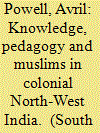

|
|
|
|
|
|
|
|